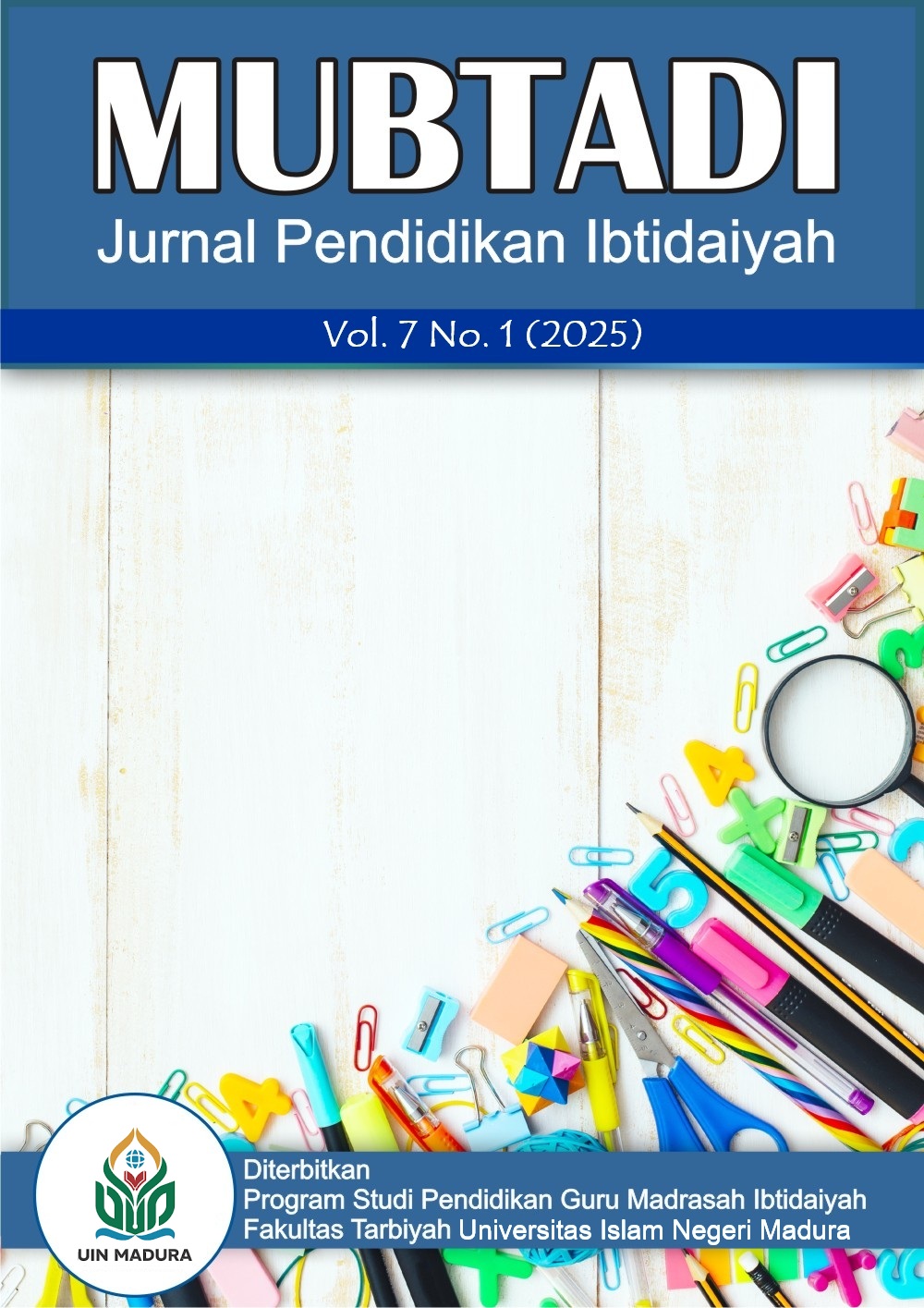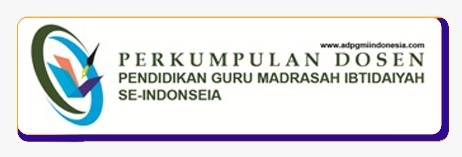PENTINGNYA IMPLEMENTASI KURIKULUM CINTA DI MADRASAH IBTIDAIYAH UNTUK MEMBENTUK KEPRIBADIAN ANAK
 Abstract views: 415
,
Abstract views: 415
,
 PDF downloads: 410
PDF downloads: 410
Abstract
Acts of dehumanisation reflecting a lack of love for fellow human beings, religion, and the environment are on the rise at the local, national, and global levels. This study discussed the importance of implementing a love-based curriculum in elementary madrasahs to instill a sense of love and sincerity in students. The study employed a qualitative method based on library research, which the sources was guidelines for implementing a love-based curriculum in madrasahs issued by Ministry of Religious Affairs of the Republic of Indonesia. The researcher used content analysis techniques in the preparation, organization, and reporting stages. The data was evaluated descriptively and analytically using critical-pedagogical procedures to assess the significance and urgency of implementing the love curriculum in shaping children's personalities, as well as a hermeneutic approach to understand the meaning of the text contextually. Triangulation of sources and cross-checking between reliable references ensured data validity, resulting in a robust conceptual synthesis based on the critical education theory framework. The research findings include: First, the love curriculum is to grow love for human and nature. Students at the madrasah ibtidaiyah are in a highly sensitive growth phase, absorbing various information around them. Introducing a curriculum of love in the dimensions of theory and behaviour can serve as a highly effective example for fostering love for fellow human beings, nature, and religion. Second, love is the basis for liberation. Love motivates students to master science and technology as assets to liberate nature, humanity, and religion from harmful elements
Downloads
References
Alfinnas, S. (2018). Arah Baru Pendidikan Islam di Era Digital. FIKROTUNA, 7(1), 803–817. https://doi.org/10.32806/jf.v7i1.3186
Al-Ghazali, A. H. (2010). كيمياء السعادة. Darul al-Muqattham.
Al-Ghazali, A. H. (2017). Ihyau Ulumi al-Din. Al-Hidayah.
Arı, Y., & Turan, M. (2023). A Crime against Humanity and the Tragedy of Genocide: An Evaluation That Israel Should Be Sued for State Terrorism against Palestinians. Uluslararası Dorlion Akademik Sosyal Araştırmalar Dergisi (DASAD), 1(2), Article 2. https://doi.org/10.5281/zenodo.10429568
Creswell, J. W., & Creswell, J. D. (2018). Research design: Qualitative, quantitative, and mixed methods approaches (Fifth edition). London: SAGE.
Edgerton, J. D., & Roberts, L. W. (2014). Cultural capital or habitus? Bourdieu and beyond in the explanation of enduring educational inequality. Theory and Research in Education, 12(2), 193–220. https://doi.org/10.1177/1477878514530231
Elo, S., & Kyngäs, H. (2008). The qualitative content analysis process. Journal of Advanced Nursing, 62(1), 107–115. https://doi.org/10.1111/j.1365-2648.2007.04569.x
Freire, P., & Macedo, D. P. (2014). Pedagogy of the oppressed: 30th Anniversary Edition (M. B. Ramos, Penerj.; 30th anniversary edition). Bloomsbury Publishing.
Gerring, J. (2017). Qualitative Methods. Annual Review of Political Science, 20(1), 15–36. https://doi.org/10.1146/annurev-polisci-092415-024158
Gomes, A. (2022). Paulo Freire: Review of “The Pedagogy of the Oppressed”: 1st Edition, Penguin Random House UK, London, 2017. Harm Reduction Journal, 19(1), 21, s12954-022-00605–00609. https://doi.org/10.1186/s12954-022-00605-9
Hlungwani, P. M. (2022). Experiences of enacting critical secondary school history pedagogy in rural Zimbabwe. Cogent Arts & Humanities, 9(1), 2010927. https://doi.org/10.1080/23311983.2021.2010927
Kemenag. (2025, Februari 26). Apa Kurikulum Cinta? Ini Pengertian dan Strategi Implementasinya [Https://kemenag.go.id/]. https://kemenag.go.id/nasional/apa-kurikulum-cinta-ini-pengertian-dan-strategi-implementasinya-MKyP0
Kemenkui RI (Direktur). (2024). Kemenkeu RI [Broadcast]. Dalam Alumni LPDP Pulang ke Indonesia dan Mengabdi di Desa. http://tiktok.com/@kemenkeuri/video/7438541148160937234
Kementerian Agama RI. (2025). Panduan Implementasi Kurikulum Cinta Di Madrasah. Direktorat KSKK Madarasah Kementerian Agama RI. https://drive.google.com/file/d/12i1ZZvHX4scbnhlUKSvqlfuYZ21Pnjwt/view
Lickona, T. (1996). Eleven Principles of Effective Character Education. Journal of Moral Education, 25(1), 93–100. https://doi.org/10.1080/0305724960250110
Luitel, B. C., Dahal, N., & Pant, B. P. (2022). Critical pedagogy: Future and hope. Journal of Transformative Praxis, 3(1), 1–8. https://doi.org/10.51474/jrtp.v3i1.599
Mananta, D. (Direktur). (2024). DMN (No. 2/10/2024) [Broadcast]. https://www.youtube.com/watch?v=0nr4Vu813Cs
Rigg, J. (2024). The Sustainable Development Goals (SDGS). Dalam E. Dauncey, V. Desai, & R. B. Potter, The Companion to Development Studies (4 ed., hlm. 253–257). Routledge. https://doi.org/10.4324/9780429282348-52
Shulhan. (2015). Konstruksi Filsafat Pendidikan Islam Profetik-Heuristik. AN NUR: Jurnal Studi Islam, 7(1), Article 1.
Shulhan. (2020). Pembentukan Moral Bina Lingkungan Bagi Peserta Didik Madrasah Ibtidaiyah. Jurnal Tarbiyah al-Awlad, 10(2), 203–2012.
Shulhan, S. (2022). Tren Baru Pesantren Untuk VIsi Indonesia Emas 2045. Al-Multaqa al-Dawliy lil-Bahts ’an Afkar at-Thullab wa-Dirasat Pesantren (MU’TAMAD), 902–918. https://www.researchgate.net/publication/385529790_Tren_Baru_Pesantren_Untuk_Visi_Indonesia_Emas_2045
Ugolnik, Z. (2025). Divine Care: Care as Religious Practice. Daedalus, 154(1), 150–165. https://doi.org/10.1162/daed_a_02129
Valls-Carol, R., Rodrigues De Mello, R., Rodríguez-Oramas, A., Khalfaoui, A., Roca-Campos, E., Guo, M., & Redondo, G. (2022). The Critical Pedagogy that Transforms the Reality. International Journal of Sociology of Education, 11(1), 58–71. https://doi.org/10.17583/rise.8900
Mubtadi: Jurnal pendidikan ibtidaiyah, adalah jurnal yang tidak berbasis komersial. tetapi memberikan lisensi kepada penulis atas karyanya. naskah penulis yang sudah di muat dapat dibuka oleh siapapun dan dapat diperguanakn oleh siapapun dengan catatan berbagi informasi tanpa dipungut baiaya apapun.



.jpg)










